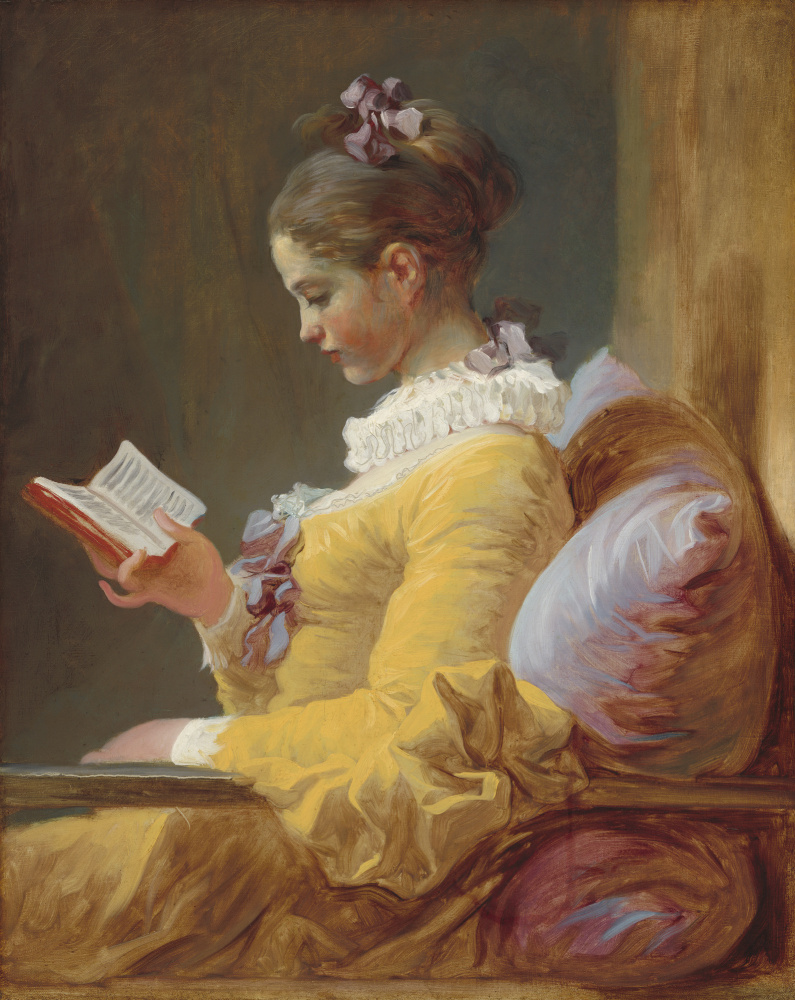log in
Enter site
Login to use Arthive functionality to the maximum
Reading girl
Jean-Honore Fragonard • Painting, 1770-th
, 64.8×81.1 cm
Description of the artwork «Reading girl»
"Reading girl"stored now in the National gallery of art (Washington) has long been considered the most popular painting by Jean Honore Fragonard.
Fragonard, as you know, in his youth, he studied in the workshops of two great French – Chardinand Bushunequivocally choosing for himself the direction in which you last worked. But "Reading girl" happily combines the lessons of both the great masters. Quite in the spirit of Chardin this scene depicts a cozy concentration of the person for the lesson, and raises her to the poetry of everyday life, while Bush declares itself through the work of disciple elegance and refined decoration.
The theme of the reading (whether books or music) Fragonard previously addressed repeatedly – remember pattern "The music lesson"or "Love letter". But in those cases, the reading or singing is necessarily superimposed on the outline of a love story. In "the Reading girl" nothing. Why? The fact that the painting was done in the mid 70-ies of the XVIII century, when the fashion for "gallant scenes" gradually fades away. On art now need more hills, more seriousness and Fragonard, apparently, wants to meet new trends. In his character there is nothing playful, nothing Flirty, in other words, nothing "typical ragnarosa".
In the age of Boucher and Fragonard the most striking art critic was Denis Diderot. His regular reviews of the Salons even now are reading quite exciting, and in those days they spoiled the painters a lot of blood. Diderot passionately denounced the Rococo art for levity and frivolity. He was biased, angry and yet incredibly insightful. For example, when at the Salon of 1769 Fragonard exhibited not quite a good oval canvas "Cupids in the sky"Diderot said it "that's a great big beautiful eggs from children's bodies... very soft, very yellow and very cool burning". And this image is scrambled so precise that it has not deleted from consciousness. So, Diderot with the same breathtaking imagery called brushwork of Fragonard "fluffy".
What does it mean? Diderot had in mind the habit of Fragonard to paint a quick expressive brush, whereby on canvas clearly shows the direction and the nature of the stroke. Among later critics, there is another term for this phenomenon – "temperamental smear Fragonard". Such sweeping strokes made a deep yellow dress "Reading girl", brown-purple cushion on which it rests, strands of her hair. The shadow on the pillow laid so thick with paint that the surface relief are traces of brush, and lit places used paint thinner. To portray pleated collar dress, Fragonard just applied a thick layer of thick white, and then turned the brush and its wooden handle outlined the folds of the collar. In the catalogues of the eighteenth century stated that "Reading girl," painted from life in one session. Apparently, it was in fact: many of the painting techniques Fragonard require courage and instantaneous reaction – they are possible, not yet dry paint.
Author: Anna Yesterday
Fragonard, as you know, in his youth, he studied in the workshops of two great French – Chardinand Bushunequivocally choosing for himself the direction in which you last worked. But "Reading girl" happily combines the lessons of both the great masters. Quite in the spirit of Chardin this scene depicts a cozy concentration of the person for the lesson, and raises her to the poetry of everyday life, while Bush declares itself through the work of disciple elegance and refined decoration.
The theme of the reading (whether books or music) Fragonard previously addressed repeatedly – remember pattern "The music lesson"or "Love letter". But in those cases, the reading or singing is necessarily superimposed on the outline of a love story. In "the Reading girl" nothing. Why? The fact that the painting was done in the mid 70-ies of the XVIII century, when the fashion for "gallant scenes" gradually fades away. On art now need more hills, more seriousness and Fragonard, apparently, wants to meet new trends. In his character there is nothing playful, nothing Flirty, in other words, nothing "typical ragnarosa".
In the age of Boucher and Fragonard the most striking art critic was Denis Diderot. His regular reviews of the Salons even now are reading quite exciting, and in those days they spoiled the painters a lot of blood. Diderot passionately denounced the Rococo art for levity and frivolity. He was biased, angry and yet incredibly insightful. For example, when at the Salon of 1769 Fragonard exhibited not quite a good oval canvas "Cupids in the sky"Diderot said it "that's a great big beautiful eggs from children's bodies... very soft, very yellow and very cool burning". And this image is scrambled so precise that it has not deleted from consciousness. So, Diderot with the same breathtaking imagery called brushwork of Fragonard "fluffy".
What does it mean? Diderot had in mind the habit of Fragonard to paint a quick expressive brush, whereby on canvas clearly shows the direction and the nature of the stroke. Among later critics, there is another term for this phenomenon – "temperamental smear Fragonard". Such sweeping strokes made a deep yellow dress "Reading girl", brown-purple cushion on which it rests, strands of her hair. The shadow on the pillow laid so thick with paint that the surface relief are traces of brush, and lit places used paint thinner. To portray pleated collar dress, Fragonard just applied a thick layer of thick white, and then turned the brush and its wooden handle outlined the folds of the collar. In the catalogues of the eighteenth century stated that "Reading girl," painted from life in one session. Apparently, it was in fact: many of the painting techniques Fragonard require courage and instantaneous reaction – they are possible, not yet dry paint.
Author: Anna Yesterday


